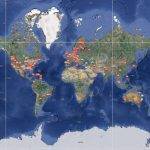 The Smart Meter Fights for Wireless Air Space
The Smart Meter Fights for Wireless Air Space
Utilities Want More Spectrum, Too
By Katie Fehrenbacher, gigaom.com
Wireless spectrum: It’s the air that mobile service providers breathe, and the U.S. Federal Communications Commission as of late has been actively freeing up chunks of wireless spectrum for our insatiable appetite for wireless services. But turns out it’s not just the cell phone companies, ambitious new ventures (LightSquared!) or Google that want more spectrum; utilities want more, too.
This week, the trade group the Utilities Telecom Council (UTC) says it has filed a request with the FCC to seek shared use of spectrum that will likely be allocated for public safety use (so, say police and firemen in your area could use mission-critical wireless services over the spectrum to get their jobs done). The chunk of spectrum is out of the 700 MHz band, and the UTC says that utilities should be eligible to share the spectrum with public safety services because they provide “public safety services.”
Read more…
Backlash Against Smart Meters: Are the Green Gizmos Really a Threat to Public Health and Privacy?
By Cameron Scott – AlterNet
Smart meters were designed to help reduce energy consumption, but some California residents claim the technology does more harm than good.
…As the state continues down the long, windy path toward a smart grid, if demand drops and backup power plants begin to close their doors, the smart meter dust-up will fall into the dustbin of history. But if energy consumption doesn’t budge, the state’s precipitous embrace of wireless smart meters may garner more attention.
Chris Danforth, a smart meter expert with the PUC’s own Division of Ratepayer Advocates, noted that PG&E’s initial proposal to the PUC would have relied on a “power-line carrier.” But the company couldn’t transmit data fast and reliably enough, according to Danforth, “so they had to change to a radio carrier — and then all these issues developed with radio.”
The PUC is deliberating over privacy concerns, but Danforth also acknowledges that the PUC’s report “may not have gone far enough with non-thermal impacts” and that “the commission should continue to look at this issue in some kind of public forum.”
Which is a big part of what Hart’s and Sandizell’s groups are demanding — so maybe they aren’t so crazy after all.
SMARTMETERS ARE A THREAT TO OUR NATIONAL SECURITY
By David L. Wilner
…There is no question that today’s spread spectrum technology used for SmartMeter radio transmission and reception is greatly advanced using complex algorithms and clever frequency hiding schemes, but these advancements are just as vulnerable as the less sophisticated ones that were introduced during World War II and used throughout the intervening years. No matter how well you design and build a security system, someone will figure out how to hack it. Read more…
Should the Wireless Sector be Concerned with Increasing EMF Militancy ?
from StimulatingBroadband.com, which bills itself as ‘Portal for the New American Broadband Economy’
“…Today’s arrests mark a new flash point among anti-smart meter groups scattered around the nation and electric utilities installing the terminals which are key elements of the emerging American smart grid infrastructure….
“When fellow Americans, no matter how few and no matter how vilified, are going into the streets to get arrested about something our industry is doing, is that really a good thing for us? Anyone that thinks it is a good thing has never actually done the hard work of permitting, licensing, or deploying the technologies that drive our country’s economy.
“Let’s drop back and listen, do some more studies, allow opt outs when necessary. The big power monopolies, like PG&E, trace their ancestry back to the robber baron era. They often remind us of that. Let’s remember that many of us in competitive telecom grew up fighting another monopoly called the Bell System. We had the American consumer on our side as we did. Let’s remember that too.”
From TIME:
Rage Against the Machine
By TOM MCNICHOL
CPUC cozies up even closer to for-profit utilities
By Dennis Wyatt – Managing Editor – Manteca Bulletin
“…Maybe, just maybe, the $20,000 a table event may have been the last supper for cronyism that has turned the CPUC into a geriatric lapdog for the Big Three of California for-profit utilities.”
Michael Laybourn: PG&E ‘Smart Meters’ — Dumb Idea
2 DOE Reports
Following on the Federal Communications Commission’s National Broadband Plan recommendations on energy and the environment, in October of 2010, DOE released two reports addressing Smart Grid policy issues.
(1) Report: Communications Requirements of Smart Grid Technologies
This report addresses communications issues related to the Smart Grid, including policy recommendations to provide utilities with increased flexibility and choice in communications options. It addresses the capability of both proprietary and commercial networks to serve the communications needs of utilities, and notes that identifying the most appropriate communications technology or network will require the consideration of a variety of factors, including the particular application in question and the location in which a technology is being deployed.
(2) Report: Data Access and Privacy Issues Related to Smart Grid Technologies
This report examines how legal and regulatory regimes are evolving to better accommodate innovation, privacy, and data-security in the development of Smart Grid technologies that could potentially draw upon personal energy-usage data. The report surveys industry, state, and federal practices in this evolving area to alert industry leaders, state regulators, and federal policy makers to trends and practices that seem most likely to accommodate all of these values and maximize the value of Smart Grid technologies. The report discusses issues on which there is broad consensus, such as the need to educate consumers about the benefits of Smart Grid technologies, and issues on which there is not yet agreement, such as the type of data that utilities should be allowed to collect and disclose to third parties, and frames these issues for further discussion.
===========
Please remember, your bite-size contributions on our Donate Page are what help keep us going







